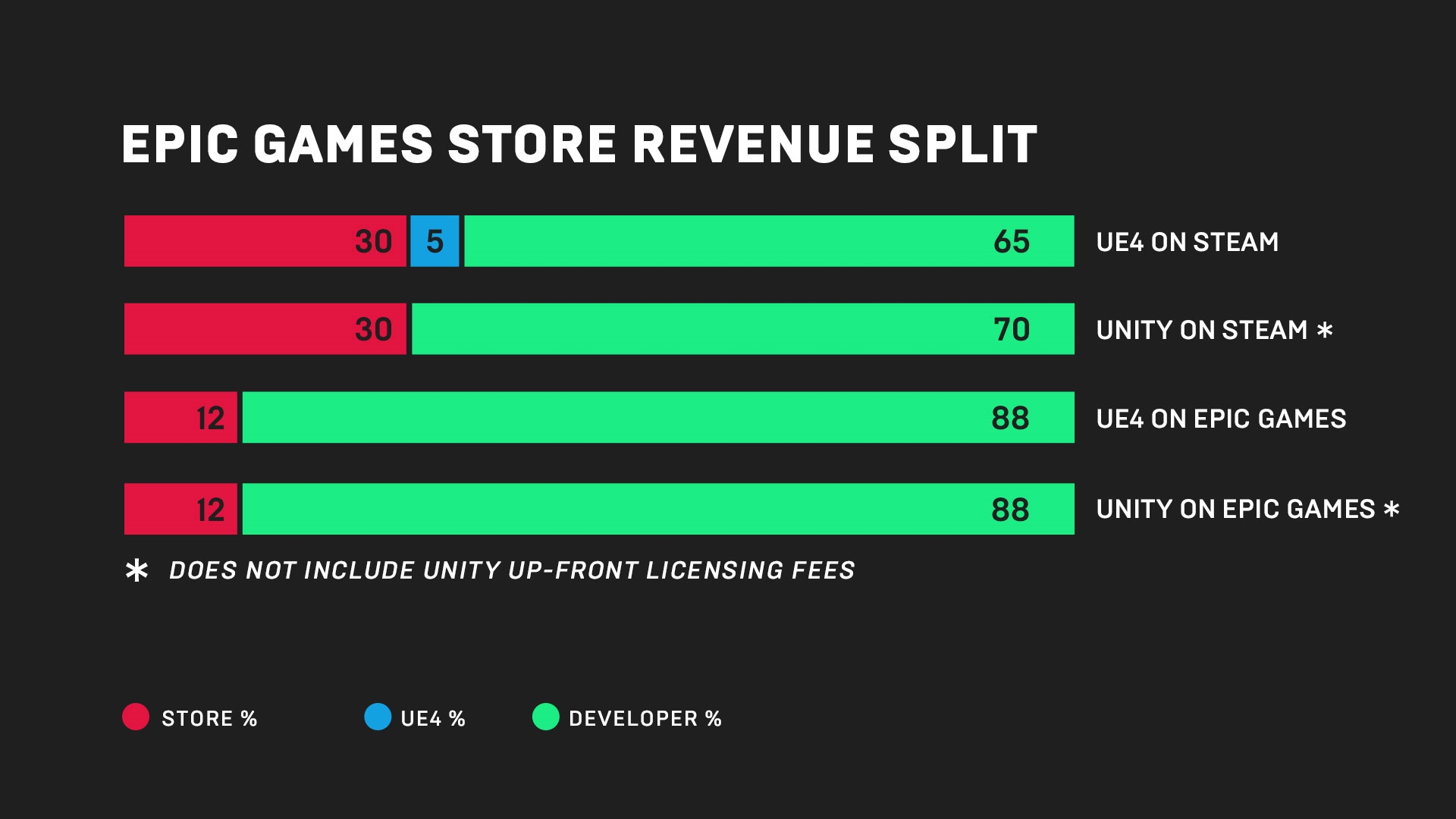
Epic Games have announced they’re launching their own digital game store – the Epic Games Store.
Tim Sweeney (Epic Game’s Founder) stated the store would launch on Windows PC and Mac in 2018, and Android in 2019. He added, “We’d like to launch on iOS in 2019, however, that is in apparent conflict with current Apple policy.”
Sweeney also states the store will be accessible through both the Epic Games launcher and through a website. Though users will need to install the Epic Games launcher to download and update games. Sweeney also says “We do not have any store-wide DRM. Developers are free to use their own DRM solutions if they choose.”
Epic explained how building the Epic Games launcher over 5 years along with Fortnite’s success and economic model (via V-Bucks) helped prepare the company for what they felt was the next step.
“As developers ourselves, we wanted two things: a store with fair economics, and a direct relationship with players. And we’ve heard that many of you want this too!
Soon we’ll launch the Epic Games store, and begin a long journey to advance the cause of all developers. The store will launch with a hand-curated set of games on PC and Mac, then it will open up more broadly to other games and to Android and other open platforms throughout 2019.”
The first principle the store will operate on is that developers can earn up to 88% of the sale’s revenue. “There are no tiers or thresholds. Epic takes 12%. And if you’re using Unreal Engine, Epic will cover the 5% engine royalty for sales on the Epic Games store, out of Epic’s 12%.”
Epic even provided a handy graph with how (allegedly) the cut developers using Unreal Engine games on Steam get.
It should be noted that while Steam did take around 30% of revenue on sales prior to October 1st, it is no longer so clear cut with how they have recently adjusted how developers gain revenue.
“When a game makes over $10 million on Steam, the revenue share for that application will adjust to 75%/25% on earnings beyond $10M. At $50 million, the revenue share will adjust to 80%/20% on earnings beyond $50M.”
The “no tiers and thresholds” mentioned in Epic’s announcement seems to have been a none-too-subtle jab at Steam’s reworked revenue system.
During the interview with Game Informer, Sweeney, explains why they went for an atypical revenue model.
“The 70/30 percent split was a breakthrough more than a decade ago with the advent of Steam, the Apple App Store, and Google Play. But today, digital software stores have grown into a $25,000,000,000+ business worldwide across all platforms, yet the economies of scale have not benefited developers. In our analysis, stores are marking up their costs 300 percent to 400 percent. We simply aim to give developers a better deal.”
” […] While running Fortnite we learned a lot about the cost of running a digital store on PC. The math is quite simple: we pay around 2.5 to 3.5 percent for payment processing for major payment methods, less than 1.5 percent for CDN costs (assuming all games are updated as often as Fortnite), and between 1 and 2 percent for variable operating and customer support costs. Fixed costs of developing and supporting the platform become negligible at a large scale. In our analysis, stores charging 30 percent are marking up their costs by 300 to 400 percent. But with developers receiving 88 percent of revenue and Epic receiving 12 percent, this store will still be a profitable business for us. The Epic Games store is a long-term effort that we’ll be extending and improving for years. Ultimately, we hope competition between stores means better deals for all developers!”
This approach to encouraging competition seems to branch beyond PC, as Sweeney says when discussing the platforms for the service:
“We believe all general purpose computing devices, such as PCs, smartphones, and tablets, should be open to competition between stores. Consoles are a different market, with dedicated game machines whose hardware costs are often partly subsidized by software revenue. Epic doesn’t seek to operate a storefront on console platforms, but as an engine maker we do everything we can to enable cross-platform interoperability.”
As another principle, those who buy a game through the Epic Games Store will be automatically be subscribed to that developer’s newsfeed and even be able to send them email if the user desires. They assure the newsfeed will be “front-and-center”.
In addition, Epic promises is that developers will be able to interact with content creators in a mutually beneficial way via Epic’s proposal:
“The 10,000-strong Epic Games Support-A-Creator program helps you reach creators, so they can help you reach players. If you opt to participate, creators who refer players to buy your game will receive a share of the revenue that you set (tracked by code or affiliate marketing link). To jumpstart the creator economy, Epic will cover the first 5% of creator revenue-sharing for the first 24 months.”
Finally, Epic vows that “There will be no store-placed ads or cross-marketing of competing games on your page, and no paid ads in search results” and that engines beyond Epic’s own Unreal engine will be welcome (initially also accepting Unity and internal engines).
The launching of a new store is sure to please Tencent Games, who have 40% ownership of Epic. This does make them technically make them only an associate, but still grants them the right to nominate directors to the board of Epic Games.
Tencent have been suffering a whopping $20 billion in losses, so a new form of revenue such as a store based in the west makes sense while China is classifying less games. Curiously, all signs point towards Tencent still giving their own Chinese-based digital game store WeGame a global release.
More details are said to be coming during The Game Awards on December 6th. We will keep you posted when we learn more as well.
So, what do you all think? Do you think Epic will be more fair for developers? Does Valve and GoG have a reason to sweat? Sound off in the comments below!
